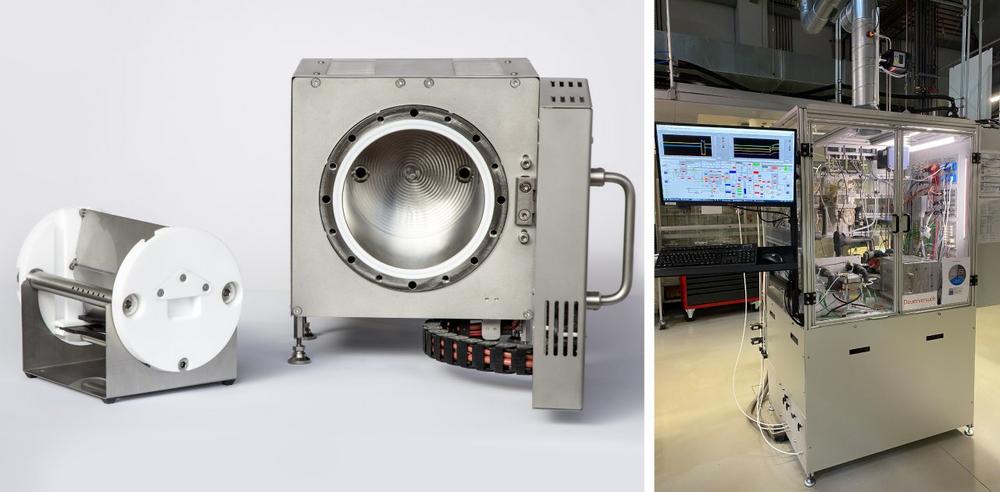Hydrogen—especially in combination with fuel cell technology—is considered a key technology for a sustainable energy future. It enables high efficiency, operates locally without emissions, and can be flexibly combined with renewable energies. Fuel cells score particularly well in mobile applications such as vehicles, buses, trains, and ships due to their long range and short refueling times compared to battery-electric drives. They offer additional advantages in heavy-duty transport and commercial vehicles, where weight and charging times are decisive factors. Fuel cells also make an important contribution to the energy transition in stationary applications, such as decentralized power and heat generation in buildings, data centers, or as emergency power supplies.
Despite these advantages, widespread use and economic scaling still face challenges: Many materials and components in today’s fuel cell systems are too expensive or too heavy. Targeted cost and weight reduction – for example, through the increased use of plastics as substitute materials – is therefore essential.
Plastics play a central role in the construction of fuel cell systems. They are used in connectors, pumps, seals, pipes, and many other components. Since these plastics can come into direct contact with reactive media and thus significantly influence the service life and functionality of the fuel cell, in-depth knowledge of media resistance, purity requirements, and the suitability of specific additives is crucial.
EVOPLAST: Plastic evaluation for fuel cells
In the EVOPLAST industry project, which ran from May 1, 2023, to April 30, 2025, the SKZ plastics center and the Center for Fuel Cell Technology (ZBT) focused on the material-specific evaluation of plastics in the field of PEM fuel cells (Proton Exchange Membrane Fuel Cells). The aim was to define application-specific criteria to systematically support the selection of polymer-based materials in terms of media resistance, purity, and long-term behavior.
Innovative in-situ test method for material evaluation
As part of the project, an in-situ test method developed by ZBT was used and further developed to qualify the influence of plastic materials on the behavior of fuel cells. The method is based on the targeted storage of plastic samples under defined conditions in a test chamber that can be integrated into either the cathode or anode supply line of the fuel cell.
The emissions released by the plastic samples are fed into a downstream fuel cell designed as a sensor cell. In this way, a direct correlation between the emitted substances and their potential effects on the electrochemical performance of the fuel cell can be determined.
“Materials used in fuel cell components – such as valves, pipes, and seals – must meet the highest requirements. The in-situ measurement method allows the influence of potentially desorbing emissions, such as volatile components from the material samples, to be analyzed and evaluated directly on cell performance,” explains Dr. Ulrich Misz from ZBT.
Test protocol for industrial practice
The in situ analysis was supplemented by ex situ investigations using gas chromatography (GC) and mass spectrometry (MS) to precisely identify the type and concentration of the emitted substances. In the course of the project, a test protocol specially tailored to the requirements of fuel cell systems was also developed and successfully implemented with regard to potential end applications.
“The combined approach of in situ performance evaluation and ex situ emission analysis enabled a comprehensive assessment of material compatibility,” says Alexander Rusam, project manager and scientist for material development and testing at SKZ.
Conclusion
1. Heterogeneity in the emission behavior of polymers
The investigations showed that, despite the same test conditions, the plastics used caused very different performance losses in the fuel cell. The measurement results for voltage loss ranged from 0%, i.e., no effect whatsoever, to 50% or total failure in terms of overall performance within a few hours.
2. Better understanding of the correlation between material composition and degradation
In the course of the project, it was found that the same base materials from several partners delivered quite different in-situ results. This confirmed the hypothesis that even small amounts of additives, such as fillers or stabilizers, can influence the desorption behavior and lead to an increased degradation rate in the fuel cell.
3. Transfer of findings to industrial process chains
The participating companies used the data obtained to systematically refine their range of materials and adapt them to specific applications. To this end, a pre-treatment step for potential emission reduction was developed and tested in the project. Impulses for optimizing the processing parameters in the manufacturing process were provided.
Further research projects planned
The findings obtained in the industry-sponsored project form a solid basis for further research activities. The SKZ Plastics Center and ZBT are currently preparing a follow-up IGF project in which in-depth investigations into material-related and system-relevant issues will be carried out. Interested companies are cordially invited to participate in this forward-looking project through the project committee. The SKZ is available to answer any questions and provide further information.
The SKZ is a climate protection company and a member of the Zuse Association. This is an association of independent, industry-related research institutions that pursue the goal of improving the performance and competitiveness of industry, especially SMEs, through innovation and networking.
SKZ – Das Kunststoff-Zentrum
Friedrich-Bergius-Ring 22
97076 Würzburg
Telefon: +49 931 4104-0
https://www.skz.de
Scientist | Material Development and Testing
Telefon: +49 (931) 4104-449
E-Mail: a.rusam@skz.de
![]()
